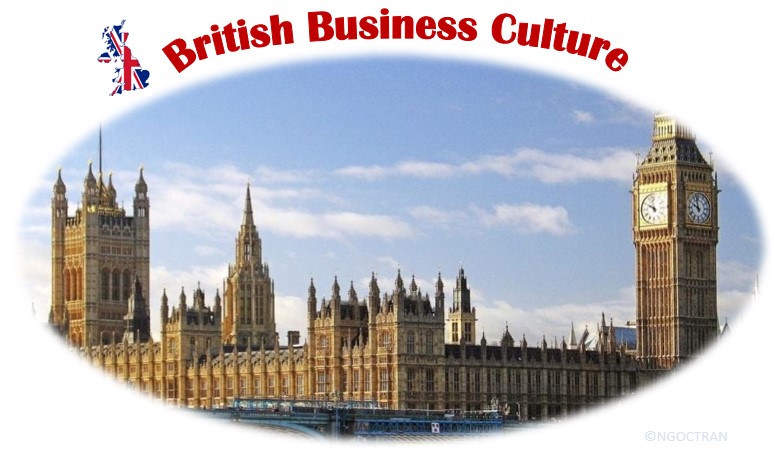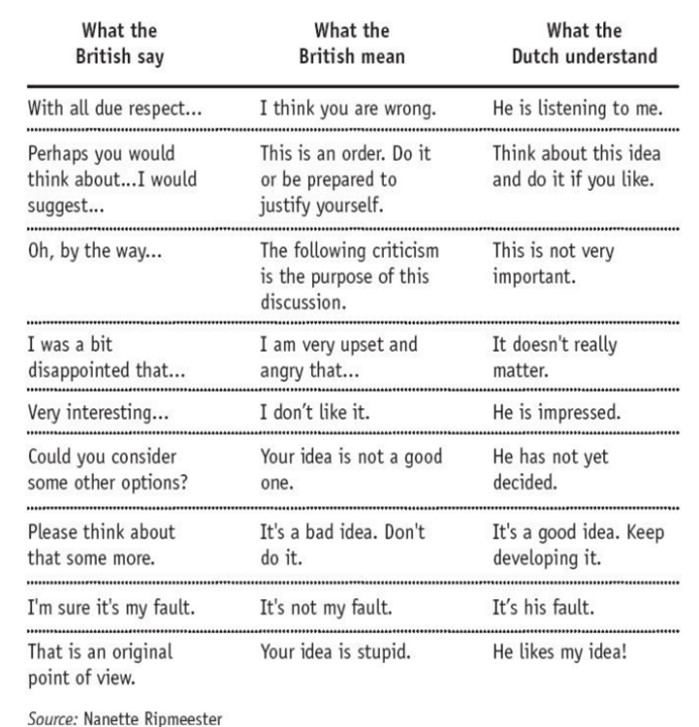Business culture in the UK: Politeness with a twist

If you passionately love the United Kingdom and desire to settle down there, then reading this blog is a good start for your dream. It contains the overview of several articles, books, and videos in order to give you a concrete overview of the British workplace culture. Are you having your tea ready? Then, let’s get started.
#1: Initial contact & business relationship
The first thing to do when meeting the British first time is to say “Hi”, shake hands, maintain direct eye contact, and introduce your name shortly. Since the British often tend to avoid misunderstanding at first, you may find the conversations with them to be in short and about general topics (e.g., weather), which acts as an icebreaker. During the conversation, remember to respect personal space and privacy of your British partner. They are known for being reserved, with an implicit message “please do not interfere with my personal space”. Furthermore, people from the UK look for long-term relationships, so a quick deal may scare them away. Thus, if you really want to make friends in your workplace, be patient and build up your reputation. Another point to learn about the British is that they are overly polite to give an honest opinion, especially when it comes to giving negative feedback, even though they are low-context communicators. A suggestion is to read between the lines, ignore all the soft words (e.g. minor, a bit, possibly) and analyze the raw message. When you gain a more solid business relationship, you can encourage them to give more direct opinions, with a purpose of achieving a common goal in work.
#2: Communication & meetings
The British mainly communicate by emails to discuss enquiries, make appointments, etc. Then, they engage in more direct means of communication, such as face-to-face/ online meetings, conference calls, etc. When writing emails, determine their proper title in a formal manner. Hierarchy in the UK is not as high as in most countries in mainland Europe but maintaining formality to some extent is expected to show courtesy and politeness to the British – the same way they treat you. When receiving a request from a British partner, it would be wise to quickly respond to them like “I received your request and will get back to you by Tuesday” – to the British, lack of explicit communication gives them a sense of something negative. Writing an email to your British colleagues should be” to the point and stick to it”.
Meeting invitations should be sent out at least a few days in advance, and if necessary, prepare an agenda before the meeting. Avoid asking personal topics (you know the reasons why). Back up your opinions with facts and figures. The British are fond of delivering ironic or sarcastic jokes, so it is advised to reciprocate their humor to develop a good atmosphere. Ensure that the meeting is not too long, and all agenda points should be discussed within the timeline. This is because British businesspeople highly value punctuality and their time. By the end of the meeting, you should verbally recap what has been decided, followed by a written meeting minutes emailed to all meeting participants.
Below is the “Anglo-Dutch Translation Guide”, which shows how British people could create confusion among listeners from other cultures (it’s Dutch culture in this case).

Figure 2 . The Anglo-Dutch Translation Guide (Meyer, 2014)
#3: Negotiation
The British negotiators are quite tough and skillful, preferring to negotiate in a fairly straightforward and honest style. It is important to acknowledge that the British believe in win-win scenarios, so your offer should emphasize on this specific point. Also, it is highly recommended to be polite, calm, formal, persistent, and flexible with your communication styles (preferably indirect communication). British negotiators tend to spend lots of time gathering information and details before the bargaining stage of a negotiation. Pace of negotiation varies depending on traditional or young British enterprises. Generally, they pursue a monochronic work style, where actions and goals should be discussed systematically, and each item should be negotiated separately. Don’t make efforts to win the time needed to evaluate alternatives or create time pressure – the British side may become very reserved and cautious.
#4: Dress code, gift policy, business cards & business entertainment
The formality in Britain’s business culture lies with its formal business attire, which are often dark colored suits for men and business suits, dresses, or blouses for women. The British highly appreciate a sense for fashion and quality. However, there are exceptions in dress code. For example, you can dress more casually in less formal sectors (e.g. IT) or on Fridays which the British call “dress down Friday”. Giving a British colleague a gift is rare in the UK business culture. It is even prohibited in written rules by some organizations. When offering a gift, ensure that it is not too expensive and too cheap (e.g. a greeting card, a souvenir, etc.). The successful conclusion of a negotiation is an acceptable occasion to exchange gifts. Business cards are also not necessary these days in the UK, but if it happens to you, British colleagues tend to exchange it during the first meeting. Finally, business entertainment is quite common in the UK, with the aim of workplace bonding. It can take place in restaurants, pubs, cafés, etc., especially on a Friday night when colleagues enjoy an after-work drink together. Business entertaining could also serve for another purpose: business-related work (e.g. negotiation), which means to discuss business over the food during lunch/ dinner.
To summarize the British business culture, remember the following sayings:
- “Be clear about what you are doing and why you are doing it”.
- “To the point and stick to it. One thing at a time”.
- “Read between the lines. Remove soft words and analyze the raw messages”.
Thank you very much for reading and please share if you find it useful!
Recommended reading:
The Culture Map (Erin Meyer, 2014)
https://www.expatica.com/uk/working/employment-basics/uk-business-culture-103182/
https://businessculture.org/northern-europe/united-kingdom-business-culture/
http://www.leadershipcrossroads.com/mat/cou/UnitedKingdom.pdf


0 Comments